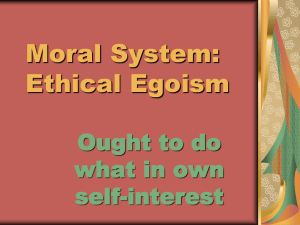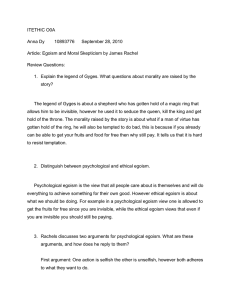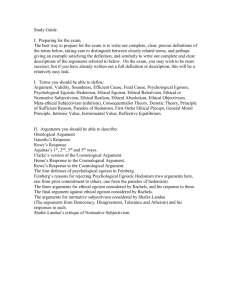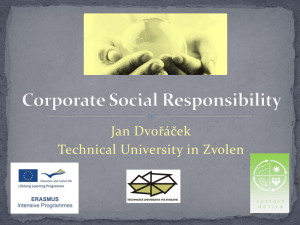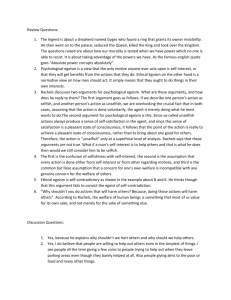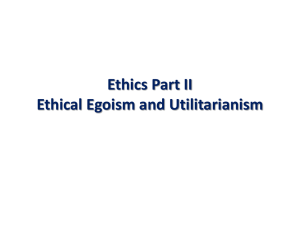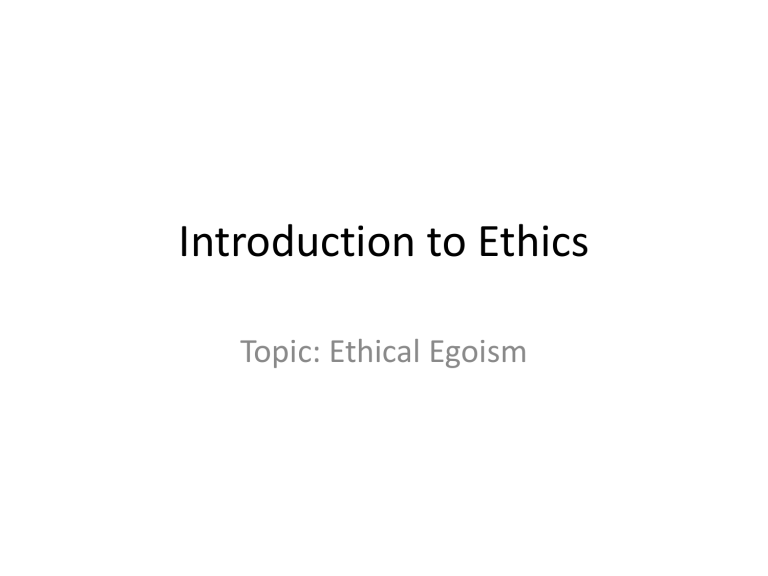
Introduction to Ethics Topic: Ethical Egoism James Rachels • • • • American philosopher University of Alabama 1941-2003 Primary focuses: – Ethics – Animal rights • Wrote The Elements of Moral Philosophy (1986) Target: Ethical Egoism Egoism: Our self-interests (sometimes) conflict with the requirements of justice or morality, but we should always act selfishly, even when our self-interests are immoral or unjust. Ethical Egoism: It is always morally correct to act in one’s own self-interest. A more explicit definition Ethical Egoism: Action x as performed by agent A is morally correct if and only if x is in A’s selfinterest. Compare: Ethical Egoism: It is always morally correct to act in one’s own self-interest. Not Psychological Egoism Psychological Egoism: -People always pursue their own interests -Every action is (ultimately) intended to satisfy some selfish desire of the one who performs it. Question: How is this different from Ethical Egoism? Things Ethical Egoism does NOT say: • One should promote one’s own interests as well as the interests of others – NO: Your only duty is to yourself • You should avoid promoting the interests of others – NO: If promoting the interests of others serves your interests, then it is morally acceptable to help others • You should do whatever will provide instant gratification – NO: “A person ought to do what really is to his or her own best advantage, over the long run. [Ethical Egoism] endorses selfishness, not foolishness.” What does it mean for Ethical Egoism to be false? Ethical Egoism: Action x as performed by agent A is morally correct if and only if x is in A’s selfinterest. ~Ethical Egoism: ? There is an action x as performed by agent A that is morally correct but not in A’s self-interest, OR x is in A’s self interest but not morally correct. Counterexamples to Ethical Egoism 2 kinds: (1) Something that is morally right but not selfish, (2) Something that is selfish but not morally right. Rachels’s counterexample • The duty to contribute to famine relief -Those who live in affluent countries can save people from dying of starvation by giving up some luxuries. -It would be morally right, but not selfish, to contribute to famine relief. We might call this an example of, Minimal Altruism: sometimes (maybe very rarely) it is morally right to act altruistically, i.e. non-selfishly Note: if Rachels is right, then Ethical Egoism is false. Three Arguments for Ethical Egoism • Altruism is self-defeating • Altruism destroys the value of human life • Ethical Egoism is the fundamental principle of morality Altruism is self-defeating • None of us knows how to care for others; we only really know how to care for ourselves. • Looking out for others is an offensive intrusion into the privacy of others. • Charity is degrading—it robs those who are helped of their dignity. Altruism is self-defeating 1. We ought to do whatever will promote the best interests of everyone alike. 2. The interests of everyone will be promoted if each of us adopts the policy of pursuing our own interests exclusively. 3. Therefore, each of us should adopt the policy of pursuing our own interests exclusively. Altruism is self-defeating Rachels says, the problem is premise 1: 1. We ought to do whatever will promote the best interests of everyone alike. Rachels says: This is not what an Ethical Egoist should think! An ethical egoist thinks the only interests you should promote are your own. Is Rachels right to dismiss this argument? Altruism destroys the value of life 1. The value of a human life is of supreme importance. 2. The ethics of altruism regards the life of the individual as something that should be sacrificed for the good of others. 3. Therefore, the ethics of altruism should be rejected. 4. Ethical Egoism is the only philosophy that places supreme value on human life. 5. Therefore, Ethical Egoism should be accepted. Altruism destroys the value of life Rachels replies: This argument presents a false dichotomy, as if the only two positions are Ethical Egoism or an extreme form of altruism in which you must sacrifice your life for others. Consider again, Minimal Altruism: sometimes (maybe very rarely) it is morally right to act altruistically, i.e. non-selfishly Ethical Egoism is the fundamental principle of morality 1. The rightness or wrongness of every action can be shown to follow from Ethical Egoism. 2. So Ethical Egoism is the best explanation of morality. 3. Inference to the best explanation: if X is the best explanation of some phenomenon, then X is true. 4. Therefore, Ethical Egoism is true. Ethical Egoism is the fundamental principle of morality • According to Rachels, the main example of this line of thought is due to Hobbes. • We establish and adhere to moral principles because it is in our own best interest to escape the state of nature. • We won’t worry about understanding Hobbes. Ethical Egoism is the fundamental principle of morality The basic idea: • Every moral principle we accept is ultimately explained by the role it plays in promoting our own self-interest. • Egoism is what explains the appearance of what appears to be other-regarding morality. Ethical Egoism is the fundamental principle of morality Is it a sound argument? Rachels argues against premise 1: It is not always in our best selfish interest to follow the general rules we agree to in order to serve our selfish interests. Sometimes we might gain by breaking the moral code. This is Glaucon’s point! Ethical Egoism is the fundamental principle of morality Understanding check: Why does Glaucon’s point that our self-interest conflicts with our moral duties undermine this argument for ethical egoism? Ethical Egoism is the fundamental principle of morality A second reply from Rachels: Even if it is always in our best selfish interest to obey the moral code, pace Glaucon, this does not show that Ethical Egoism is true. It does not prove that self-interest is the only reason for one to do what is right. Ethical Egoism is the fundamental principle of morality A second reply from Rachels: In other words, even if morality requires us to act in ways that always promote our selfish interests, that doesn’t show that our reasons for acting morally are always selfish. Ethical Egoism is the fundamental principle of morality Example: I bring flowers to my sick grandmother. Then an ethical egoist points out that doing so increases my reputation and makes me feel good. I could legitimately reply that those were not my reasons for bringing her flowers. Is Rachels’s second reply any good? Ethical Egoism: Action x as performed by agent A is morally correct if and only if x is in A’s selfinterest. • Nothing here about our reasons for acting... • Maybe this definition needs to be revised so that it explicitly mentions reasons? • As stated, Rachels’s second reply does not contradict ethical egoism. Recap: Outline of Paper • Part 1: Clarify the thesis of Ethical Egoism – Distinguish it from Psychological egoism – Explain what EE does NOT say • Part 2: Three arguments FOR Ethical Egoism • Try to find the best arguments for EE and show that they are not good. • Part 3: Three arguments AGAINST Ethical Egoism – (This is where we are now) Part 3: Three arguments AGAINST Ethical Egoism Rachels considers three arguments against EE. He shows that two of those arguments are bad. He thinks one of them is good. Question: If Rachels is trying to argue against Ethical Egoism, why is he trying to show that some of the arguments against EE are bad? Three arguments against EE 1. Ethical Egoism fails to resolve moral conflicts 2. Ethical Egoism is logically inconsistent 3. Ethical Egoism entails arbitrary moral distinctions Argument #1 Rachels considers the following (weird) case: • B and K are candidates for the presidency. • It would be in B’s interest if K were liquidated (killed), • and it would be in K’s interest if B were liquidated (killed). • Similarly, it is in B’s interest to foil K’s murder plan and it is in K’s interest to foil B’s plan. Argument #1 • Who is right and who is wrong in this scenario? • According to Ethical Egoism, the plans of both B and K are morally correct (because they are each appropriately selfish). • But their plans are in conflict with each other. • A moral theory should resolve conflicts by telling us which plans should be pursued. • Therefore, Ethical Egoism fails as a moral theory. Argument #1 • Before we get to Rachels’s response... This case is weird. a. Ethical Egoism doesn’t entail that presidential candidates should try to kill each other... b. The case seems needlessly complicated, i.e. it is a bad thought experiment. Question: Can anyone think of a better example of two people with conflicting selfish interests? Argument #1 • Rachels’s reply: An Ethical Egoist does not need to agree that the point of a moral theory is to resolve conflicts of interest. An Ethical Egoist can maintain that the point of a moral theory is to tell us what we should do, i.e. that we should act selfishly and try to ensure that our own selfish interests win out whenever they conflict with other people’s selfish interests. Argument #1 • Note: Rachels is saying this is a bad argument against Ethical Egoism • YET he still believes Ethical Egoism is false Argument #1 • This is an example of an important aspect of philosophy: • Philosophers do not want to accept bad arguments, even when those arguments support their beliefs. • Philosophers want to find good arguments in support of the positions they hold. Argument #2 • Ethical Egoism entails a contradiction (and so must be false): “It is in B’s interest to kill K, and obviously in K’s interest to prevent it. But... If K prevents B from liquidating him, his act must be said to be both wrong and not wrong—wrong because it is the prevention of what B ought to do, his duty...not wrong because it is what K ought to do... But one and the same act (logically) cannot be both morally wrong and not morally wrong.” Argument #2 • K’s action X is both – Wrong: because x prevents B from pursuing his selfish goals – Right: because x promotes K’s selfish goals Argument #2 • Rachels’s reply: – Ethical Egoism doesn’t entail that it is inherently wrong to prevent someone from pursuing their selfish goals. – So K’s action is just right; it is not also wrong. Argument #2 Can anyone think of a better case to show that Ethical Egoism is contradictory? Argument #3 1. Any moral doctrine that assigns greater importance to the interests of one group than to those of another is unacceptably arbitrary unless there is some difference between the members of the groups that justifies treating them differently. Argument #3 2. Ethical Egoism would have each person assign greater importance to his or her own interests to than to the interests of others. But there is no general difference between oneself and others, to which each person can appeal, that justifies this difference in treatment. 3. Therefore, Ethical Egoism is unacceptably arbitrary. Problematic Aspect of Argument #3 Rachels supports premise 1 by talking about racism. Racism (Rachels’s definition): dividing people into groups according to race and and assigning greater importance to the interests of one race than to others. Problematic Aspect of Argument #3 According to Rachels, racism is wrong because it is arbitrary. Rachels states an entailment of this view: racism would be right if differences between races could be identified that justified different treatment... Problematic Aspect of Argument #3 “In the past, racists have sometimes attempted to do this by picturing blacks as stupid, lacking in ambition, and the like. If this were true, then it might justify treating them differently, in at least some circumstances... But of course it is not true, and in fact there are no such general differences between the races.” –Rachels This is messed up. Problematic Aspect of Argument #3 Rachels is saying that if racist stereotypes were true it might justify oppression. Besides missing the point of why racism is bad, Rachels’s thought also encourages the kinds of racist science that attempt to justify the oppression of peoples of color by seeking to prove that people of color are culturally or genetically inferior to whites. Problematic Aspect of Argument #3 Racism is a form of systemic, structural oppression that functions to privilege the dominant (i.e. white) racial group. The wrongness of racism does not consist in the arbitrariness of the identification of whites as superior to people of color. Rachels mistaken definition of racism leads him to this messed up line of reasoning in support of premise 1. Problematic Aspect of Argument #3 Does that mean premise 1 is false? 1. Any moral doctrine that assigns greater importance to the interests of one group than to those of another is unacceptably arbitrary unless there is some difference between the members of the groups that justifies treating them differently. No, we can still accept the argument. We should just be clear that racism is not an example of a moral doctrine that is bad simply because it is unacceptably arbitrary. Summing up: • Egoism vs. ethical egoism vs. psychological egoism • 3 arguments for ethical egoism – Rachels: all of these fail • 3 arguments against – Rachels: the first two fail; the last succeeds
